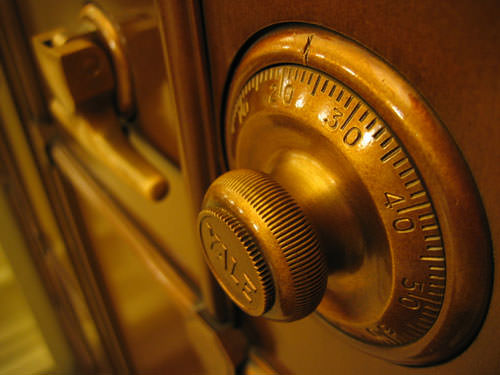
Image courtesy of reynermedia
What happens with assets in a locked safe?
During the course of a liquidation, assets and accounts must be evaluated to determine which assets belong to the company, making them available as a means to pay creditors. This, as you know, is standard practice.
We would like to talk about a liquidation, which has been covered by the media, where a locked safe was discovered. Curiously, no one at the company in question was able to unlock the safe, generating a great deal of speculation. What was in the safe? Of course, the mind is left to imagines all sorts of magnificent treasures … and, usually, reality doesn’t quite match up.
To the surprise of many, the safe held half a million dollars in gold bars ….
What happens next?
This discovery must be handled with the same level of care given to all company matters during liquidation. Of course, with actual gold involved, one question becomes most pressing: who gets the gold bars?
Is this discovery a company asset available to creditors … or something else?
Any liquidator appointed to manage company funds is required to investigate. He or she must determine whether or not the contents of the safe belong to the company before moving forward. If, for example, the gold bars are being held in trust, they cannot be used to pay company debts.
Assets held in trust must remain separate
As you know, customer or creditor funds held in a trust are separate from company assets. In a liquidation, these funds must be returned to trust beneficiaries.
For example, Ticketmaster holds funds obtained from ticket sales in a trust so customers get their money back if the company should go into liquidation. This is a responsible practice that protects consumers paying in advance for goods or services by purchasing vouchers or giftcards or paying deposits.
Further, trading foreign currency in volume is made possible by trust accounts. These accounts exist to hold client money so funds remain the property of clients should a company involved in this practice go into liquidation.
In the case of gaming companies where funds are held on behalf of betting clients, a trust must also be used to ensure client funds remain separate from company assets.
Until insolvency laws change, customers remain unsecured creditors and they would be wise to confirm that monies paid to a company by them in good faith is being correctly held on trust.
What happens when funds commingle or they are not declared as trust funds?
There are times when things become more complicated. If, for example a director’s personal funds or company funds are commingled with trust funds, it can be more challenging to determine which funds are available to creditors …
However, this sort of confusion may lead to penalties for the trustee who should have been aware of their responsibilities when creating the trust and managing it.
As liquidators, we do not have to prove any assets are held in trust; rather the company must do so. Funds held in trust should be:
- Separate
- Accountable
- Identifiable
If, for some reason, segregated accounts are not clearly identified as trust accounts but are still claimed as holding trust funds, these assets may become available to creditors based on the outcome of our investigation. The source of the funds is evaluated as well as the intention of the company.
If the source of the funds cannot be identified or it becomes clear the funds were not held on behalf of creditors in trust, those funds could, in fact, become available to other creditors in a liquidation. The only way to avoid grey areas is to label trust accounts appropriately and manage them in compliance with the law … in a recent case we sought directions from the Court to confirm we were able, as liquidators, to access and deal with commingled funds of a forex trader. In that case, I’m pleased to say, we were able to return 100 cents on the dollar to all of the company’s clients.
The takeaway
During liquidation, the burden of proof lies with a company if and when assets are claimed as being held in trust.
For this reason, every company should ensure that clear records are maintained of what assets are held in trust. If trust accounts were not set up properly at the start or were later commingled, assets held in trust may still be used to pay back the company’s creditors.
Further, trustees have a duty to ensure funds are handled appropriately and are potentially subject to legal consequences if this is not the case.
If you have a client in liquidation with concerns about assets held in trust and you would like advice, please feel to contact Simon at sdalton@gerryrea.co.nz.
